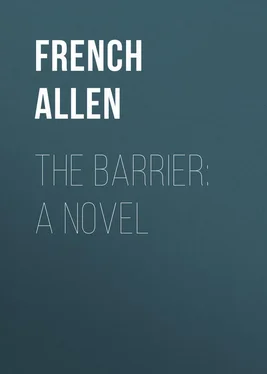Allen French - The Barrier - A Novel
Здесь есть возможность читать онлайн «Allen French - The Barrier - A Novel» — ознакомительный отрывок электронной книги совершенно бесплатно, а после прочтения отрывка купить полную версию. В некоторых случаях можно слушать аудио, скачать через торрент в формате fb2 и присутствует краткое содержание. Жанр: foreign_antique, foreign_prose, на английском языке. Описание произведения, (предисловие) а так же отзывы посетителей доступны на портале библиотеки ЛибКат.
- Название:The Barrier: A Novel
- Автор:
- Жанр:
- Год:неизвестен
- ISBN:нет данных
- Рейтинг книги:4 / 5. Голосов: 1
-
Избранное:Добавить в избранное
- Отзывы:
-
Ваша оценка:
- 80
- 1
- 2
- 3
- 4
- 5
The Barrier: A Novel: краткое содержание, описание и аннотация
Предлагаем к чтению аннотацию, описание, краткое содержание или предисловие (зависит от того, что написал сам автор книги «The Barrier: A Novel»). Если вы не нашли необходимую информацию о книге — напишите в комментариях, мы постараемся отыскать её.
The Barrier: A Novel — читать онлайн ознакомительный отрывок
Ниже представлен текст книги, разбитый по страницам. Система сохранения места последней прочитанной страницы, позволяет с удобством читать онлайн бесплатно книгу «The Barrier: A Novel», без необходимости каждый раз заново искать на чём Вы остановились. Поставьте закладку, и сможете в любой момент перейти на страницу, на которой закончили чтение.
Интервал:
Закладка:
"Since this morning," he said, "I have been offered three positions."
"Oh!" cried Judith. The involuntary note of surprise showed how she had underrated him, and Mather bit his lip.
Ellis spoke. "If you will take a position on the street-railroad – "
"Nothing subordinate there!" cut in Mather very positively.
"Then," said Ellis, "if you care to be the head of the water company – "
"Oh!" Judith exclaimed before Ellis had completed his offer. "Such an opportunity!"
Mather himself looked at Ellis in surprise. It was an opening which, coming from any other source, he would have accepted eagerly, as a task in which he could give free play to all his powers. Did Ellis really mean it? But the promoter, having swiftly asked himself the same question, was sure of his own wisdom. The place needed a man: here was one. Besides, Ellis would have given much to tie Mather to him.
"I mean it," he said positively.
"You must accept," added Judith.
It was too much for Mather to bear. His defeat by Ellis and his loss of Judith – both of these he could sustain as separate calamities. But when he saw her thus siding with his victor, Mather forgot himself, forgot that Ellis was not a man to defy lightly, and spoke the impolitic truth.
"I could not work with Mr. Ellis under any circumstances!"
"George!" cried Judith hotly.
Then there was silence as the men looked at each other. Had Judith been the woman that in her weaker moments she was pleased to think herself, she would have studied the two. But she was neither cool nor impartial; she had put her feelings on Ellis's side, and looked at Mather with indignation. She missed, therefore, the pose of his head and the fire of his eye. She missed as well the narrowing of Ellis's eyes, the forward stretch of his thin neck – snaky actions which expressed his perfect self-possession, and his threat. Neither of them spoke, but Judith did as she turned away.
"You are very rude," she said coldly. "Come, Mr. Ellis, let us walk again." Ellis followed her; Mather stood and watched them walk away.
"It was shameful of him," said Judith when she and Ellis were out of hearing.
"He is young," remarked the other. He was watching her now, as he had watched Mather, out of narrow eyes. Mather's words meant a declaration of interest in Judith, confirming gossip. She was supposed to have refused him, and yet she was biting her lip – would she be quite so moved if Mather had not the power to do it? Ellis promised himself that he would remember this.
"He will know better some day," he said. "But at least he is out of the question. Can you not suggest some one else?"
"There is Mr. Pease," she answered.
Pease and himself – oil and water! How little she knew! and he almost laughed. But he answered meditatively: "He is very – set."
"I see my father is coming for me," she said.
"Let me ask you this, then," he begged quickly. "May I come to see you – at your house?"
"I am afraid not – yet," she answered. She was not ungracious, and continued with much interest: "But Mr. Ellis, I shall be so anxious to hear how it all goes. I am sorry I cannot help you with the men, but the principle is [she thought of Mather] choose the weak ones, not the strong. Here is my father. Father, this is Mr. Ellis."
Colonel Blanchard was affable. "How de do?" he said breezily. "Fine day for the match, Mr. Ellis."
"A very fine day," answered Ellis, pleased by the way in which the Colonel looked at him; Blanchard seemed interested, like his daughter. But Judith thought that the conversation had best end there.
"The carriage has come?" she asked.
"Yes," answered the Colonel. "Beth is in it, waiting for us. You know she goes out to dinner." He begged Ellis to excuse them, and so carried his daughter away.
Ellis looked after them; these two, at least, had treated him well. The Colonel had stared with almost bourgeois interest, as if impressible by wealth and power. Ellis mused over the possibility of such a thing.
"The weak," he said, repeating Judith's words. "The weak, not the strong."
Then Mrs. Harmon swooped down on him. "Here you are," she said petulantly. "Everybody's going. Let us go too."
CHAPTER IV
Mrs. Harmon was very petulant; indeed, her aspect in one of lower station would have been deemed sulky. Reviewing the afternoon, she was convinced that to have brought Ellis there was a great mistake. Why should she take up with him, anyway? He could give her nothing but – trinkets; the old acquaintance was not so close that she was bound to help him. It had been condescension on her part; she might as well stop it now; yes, she might as well.
Yet she thought with some uneasiness of those trinkets. To accept them had not bound her to him, had it? Their money value was nothing to him. She could break from him gradually – that would be simple enough – and she could make a beginning on the drive home, for silence could show her feelings.
Ellis understood her after one glance, which expressed not only his impatience with her instability, but also a sudden new repulsion. The afternoon had opened his eyes to what the finer women were. How could he have supposed that Mrs. Harmon was really in the inner circle? How she contrasted with Judith! She seemed so flat beside the girl; she was his own kind, while Judith was better. He wished that he might drop the woman and pin his hopes to the girl.
But he could not spare Mrs. Harmon, and he had no fear that she would drop him, for he knew all her weaknesses. She was ambitious to a certain degree, but after that, lazy; she was fond of comfort, fond of – trinkets, with a healthy indifference to ways and means. In fact, although Ellis did not so phrase it, there was a barbaric strain in her, a yearning for flesh-pots and show, in which her husband's tastes and means did not permit her to indulge herself. Ellis knew that he could manage her.
"Lydia," he said, "I want to thank you for the afternoon. It must have been a great bother to you. I'm afraid I spoiled your fun."
She could but respond. "Oh, not much."
"Look here," he went on. "You know me, I think; we understand each other pretty well. These people," and he waved his hand to include the whole golf club, "are not to be too much for us. Do you mind my saying a few words about myself?"
"Oh, no!" she exclaimed with involuntary interest; for he seldom spoke his thoughts.
"That girl, Miss Blanchard," he said, "was very good to me."
"She was?" Mrs. Harmon could not subdue an accent of surprise, but hastened to explain. "I've sometimes found her haughty."
"I shan't forget you introduced me to her," said Ellis. "I mean to follow up my acquaintance there."
"No girl," suggested Mrs. Harmon, "has much influence. No unmarried woman, I mean."
"But when Miss Blanchard marries she will have it then?"
"Yes," answered Mrs. Harmon thoughtfully, and then very positively: "Yes, I think she would be a leader of the younger set."
"I am sure she would." Ellis nodded confidently. Judith had faults, notably rashness, but under wise guidance she could develop masterly qualities.
"But why – " began Mrs. Harmon in some perplexity. Then she caught sight of her companion's expression. "What! you don't mean to say that you – you would?"
"Why not?" asked Ellis. "Is it so very strange?"
"You are over forty!" cried Mrs. Harmon.
"Nothing to do with the case," he replied shortly.
"N-no," agreed Mrs. Harmon slowly. "No, I believe not – not with Judith." She looked at her companion with sudden respect. "I believe you've hit upon it! I didn't know you thought of anything of the kind."
"I need you, just the same," said Ellis. "You will help me?"
Читать дальшеИнтервал:
Закладка:
Похожие книги на «The Barrier: A Novel»
Представляем Вашему вниманию похожие книги на «The Barrier: A Novel» списком для выбора. Мы отобрали схожую по названию и смыслу литературу в надежде предоставить читателям больше вариантов отыскать новые, интересные, ещё непрочитанные произведения.
Обсуждение, отзывы о книге «The Barrier: A Novel» и просто собственные мнения читателей. Оставьте ваши комментарии, напишите, что Вы думаете о произведении, его смысле или главных героях. Укажите что конкретно понравилось, а что нет, и почему Вы так считаете.












